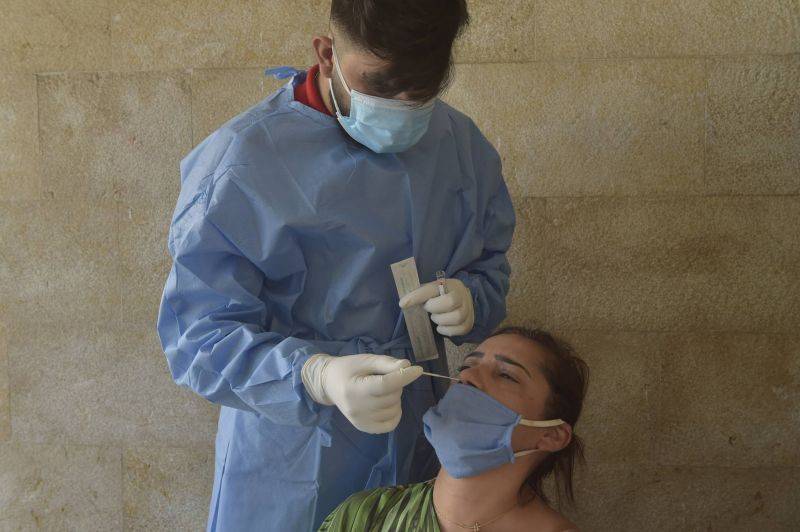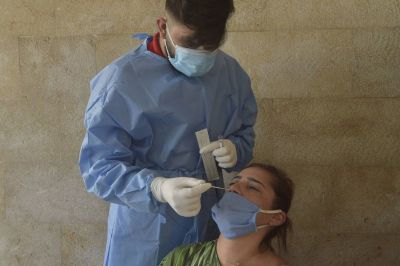
A woman is tested for COVID-19 in Antelias, north of Beirut. (Credit: Annahar)
Outgoing Health Minister Hamad Hassan’s announcement last week that Lebanon could secure a coronavirus vaccine by November has been met with caution — and skepticism — by the medical community.
The minister did not elaborate on a source for the vaccine in his statements, and, as of yet, neither the World Health Organization nor the US Food and Drug Administration has approved any vaccine for the coronavirus. On Monday, he reiterated Lebanon's “right” to access the coronavirus vaccine and added that the ministry was communicating with Russian laboratories and Chinese vaccine manufacturers to reserve investment rights for the private sector.
Russia has announced it has registered two vaccines for COVID-19, a step required in the country prior to the final phase of clinical trials. Meanwhile, the American pharmaceutical giant Pfizer plans to seek emergency authorization for its COVID-19 vaccine from US authorities in the third week of November.
Previously, Hassan had said that Lebanon was a part of COVAX, a group established by the WHO to ensure global equitable access to the vaccine as soon as one is available on the market. Given any vaccine available in Hassan’s new timeline would not be accessed via the group, this has raised concerns about where it will be sourced and what exactly would be offered to the Lebanese.
Hezbollah, which the minister is close to, has called on Lebanon to “turn east” for economic connections as the US imposes further sanctions on the party. The race for a COVID-19 vaccine has recently escalated between Russia and the US.
The pertinent question, however, is: Would Lebanon favor the Russian vaccine over the American one for political reasons, even if the Russian vaccine remains controversial?
“The ministry will only buy the Russian vaccine if it successfully passes the third phase of clinical trials and if the data is approved internationally,” Edmond Abboud, an adviser to the health minister, told L’Orient-Le Jour.
He added that the ministry has made contact with Pfizer and the Russian Embassy in Beirut to ensure that Lebanon gets its share of a vaccine once it is placed on market, whether it comes from the US or Russia.
Last week, Hassan also raised the possibility that 20 percent of Lebanon’s vaccine needs could be financed by the World Bank. This was confirmed by a source at the World Bank, provided that the vaccine in question is evaluated and approved globally.
“The World Bank is ready to look into any request made by the Health Ministry to finance the purchase of vaccines for COVID-19 once they have been clinically approved and recognized by an international entity,” the source said.
Risk of adverse effects
Rima Moghnieh, a professor of infectious diseases at the Makassed General Hospital in Beirut, explains that process for the development of a vaccine is split into three phrases: Phase one is laboratory tests, phase two is limited testing on humans, and phase three is testing on a larger scale to determine whether or not the vaccine is safe to be marketed.
“Once this final step is completed, it takes two months to monitor any side effects of the vaccine, before being approved by the FDA or WHO,” she said.
She noted that while it was not clear which vaccine the minister was referring to, the Russian vaccine has not yet reached phase three of clinical trials, while “Pfizer is demanding to be exempted from the two-month wait to urgently launch its vaccine in November.”
When asked what the risks were for a patient if administered a vaccine that has not undergone phase three testing, Moghnieh said it was simply unknown, and so could pose “a risk of dangerous side effects.”
She elaborated, “If a vaccine is put on the market this early, it would be as if the patients who take it are in phase three of testing. Such an approach could give a false impression of safety since the vaccine can prove to be harmful or ineffective. This would affect the progression of the pandemic.”
“So far, COVID-19 patients in Lebanon are treated with antivirals, plasma, cortisone and anticoagulants, depending on the severity of their conditions,” Moghnieh says.
Ismail Sukkarieh, a doctor and outspoken former MP, also raised concerns about the health risks of pushing forward with an untested vaccine, calling the minister’s promises of a vaccine by next month “dangerous,” as no vaccine has been approved by any major health authority.
Expressing his bafflement at the announcement, the doctor asked if there was a political message behind the statement, saying, “Is he putting on a show? Is this about a political and economic conflict? ... The minister did not mention what vaccine he was exactly talking about. Are we going to acquire the Russian vaccine or even the Chinese one?”
Earlier this month, medical journal The Lancet released the results of their study into one of the potential coronavirus vaccines developed in China, finding it was safe and well-tolerated among the trial’s patients.
This vaccine has already been approved for an emergency vaccination campaign in China, involving hundreds of thousands of essential workers and employees in other groups considered to be at high risk. However, here too, the third and final phase of clinical trials has yet to be completed.
“Who will take the responsibility for importing vaccines that are not approved by WHO or the FDA in the Lebanese market?” Sukkarieh asks. “Every vaccine has side effects that need to be monitored. It has to be tested on tens of thousands of people with various symptoms.”
Sukkarieh added that it will probably be necessary to wait until spring 2021 for a reliable vaccine for COVID-19 to be available on the market.
This article was originally published in French in L'Orient-Le Jour.
